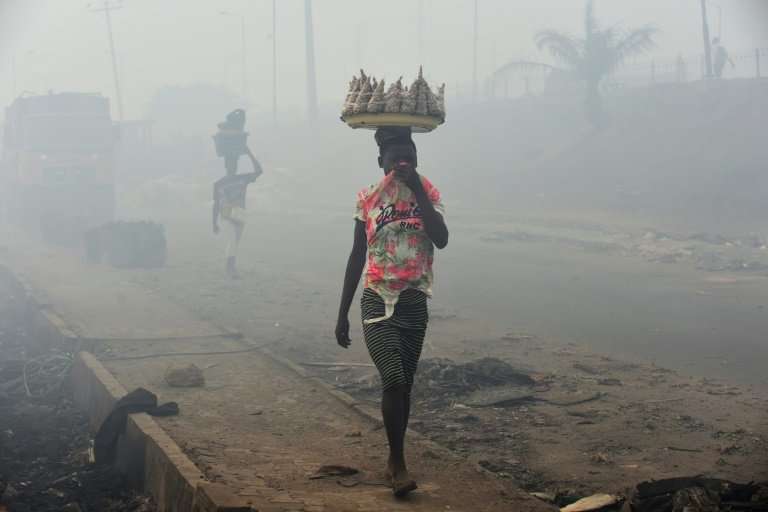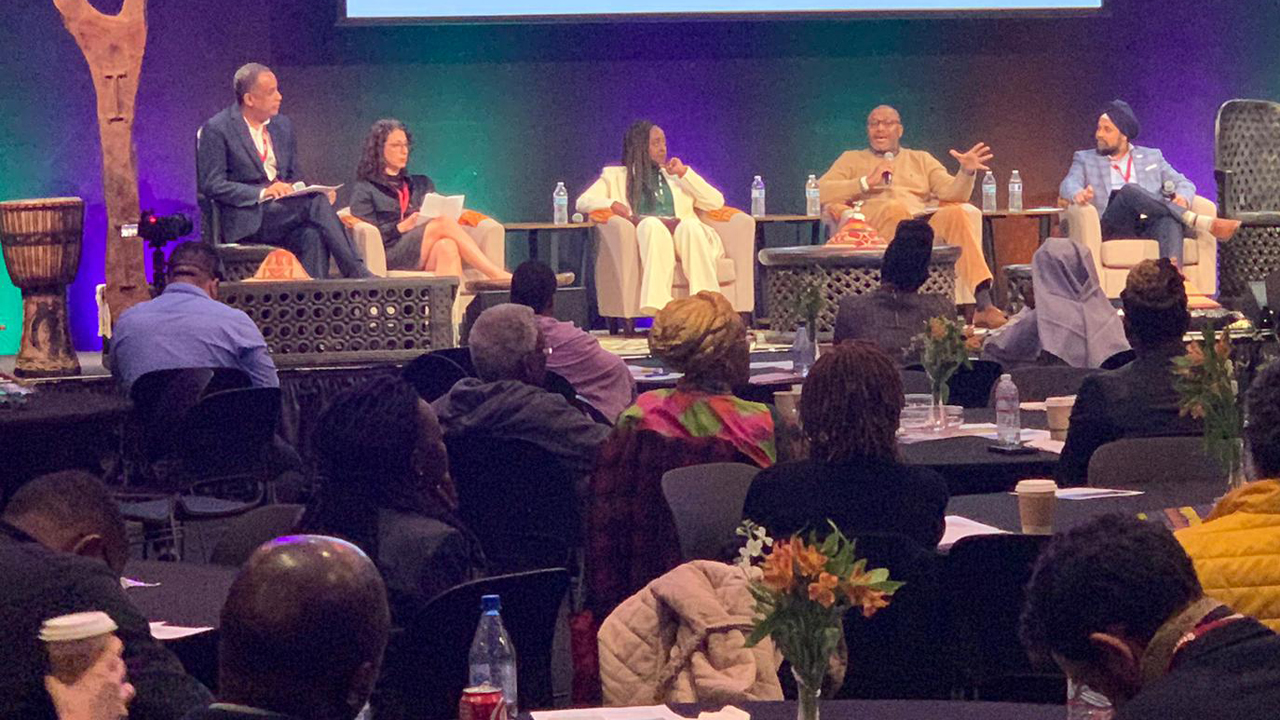 A panel session on ESG (Environmental, Social and Governance metrics) and Sustainable Investment into Africa
A panel session on ESG (Environmental, Social and Governance metrics) and Sustainable Investment into Africa
• Diaspora remittances outweighs FDIs into continent
• Aboyeji: Knowledge transfer more important to Africa than aid
• Sall receives prestigious Barka Award, 10 Diaspora leaders get Luminaire Awards
• Nuns, through ADN, create social enterprise startups to help African communities
Africa remains an attractive investment destination, according to the EY Attractiveness Report Africa, with the service sector showing an increase in 72 per cent of its share of Foreign Direct Investment (FDI) projects.
Presenting the report at the just concluded African Diaspora Investment Symposium (ADIS23) in Silicon Valley, California, Associate Director, Global Innovation at EY Sustainability, Mary-Ivy Mbayah, said the EY’s 2022 Attractiveness Report shows that Africa, amid global challenges, is still an attractive investment destination, with its young population and vast natural resources giving it the potential for enormous growth and innovation.
“But realising this potential would require significant investment in education and skills development. It will also require rapid economic reform, good governance, and a stable political landscape and there are promising signs of this in several countries, while others still lag behind. Africa is poised for a reset and investors must be forward thinking,” she said.
One of the most promising developments is the African Continental Free Trade Area (AfCFTA), which has potential to create the biggest free trade area in the world, cutting red tape and boosting trade throughout the continent. AfCFTA also presents a potential income gain for Africa of $450 billion by 2035.
In 2021, despite the ravaging effect of COVID-19, FDI to African countries hit a record $83 billion, as contained in United Nations Conference on Trade and Development’s (UNCTAD) World Investment Report 2022 published June 9, last year.
While the 2022 report is yet to be published, it is expected that the FDI figure will take a massive hit due to the diversion of funds by development partners to Russia’s war in Ukraine.
The budgets in Europe have been deeply affected by the Ukraine war, which has been on since February last year, as a result, there has been tightening of aid funds with the little available deployed to the humanitarian crisis in Ukraine.
However, in the same 2021, recorded remittances from the Africa Diaspora to the continent reached over $95 billion, which reflects the magnitude by which Africans in the diaspora are participating in the continent’s economic development.

This fact was recently acknowledged by President of African Development Bank Group (AfDB), Dr. Akinwumi Adesina, who said Africans in diaspora are critical for the continent’s economic development, as they constitute its largest financiers through remittances.
Adesina said: “The value of remittances from the African diaspora doubled from $37 billion in 2010 to $87 billion in 2019, reaching $95.6 billion by 2021. Yet, official development assistance to Africa in 2021 was $35 billion, or 36 per cent of the remittances from the diaspora. Egypt and Nigeria are among the top-ten remittance recipients globally, with $31.5 billion and $19.2 billion, respectively in 2021.
“The African diaspora has become the largest financier in Africa! And it is not debt, it is 100 per cent gifts or grants, a new form of concessional financing that is the key for livelihood security for millions of Africans.”
He noted that while remittances have helped to meet financial, food, education, and health needs, as well as serve as countercyclical sources of finance and social protection, much could be done to better tap into these remittances for Africa’s development.
This was the kernel of discourse at the ADIS23 event, organised by the African Diaspora Network (ADN) in Silicon Valley.
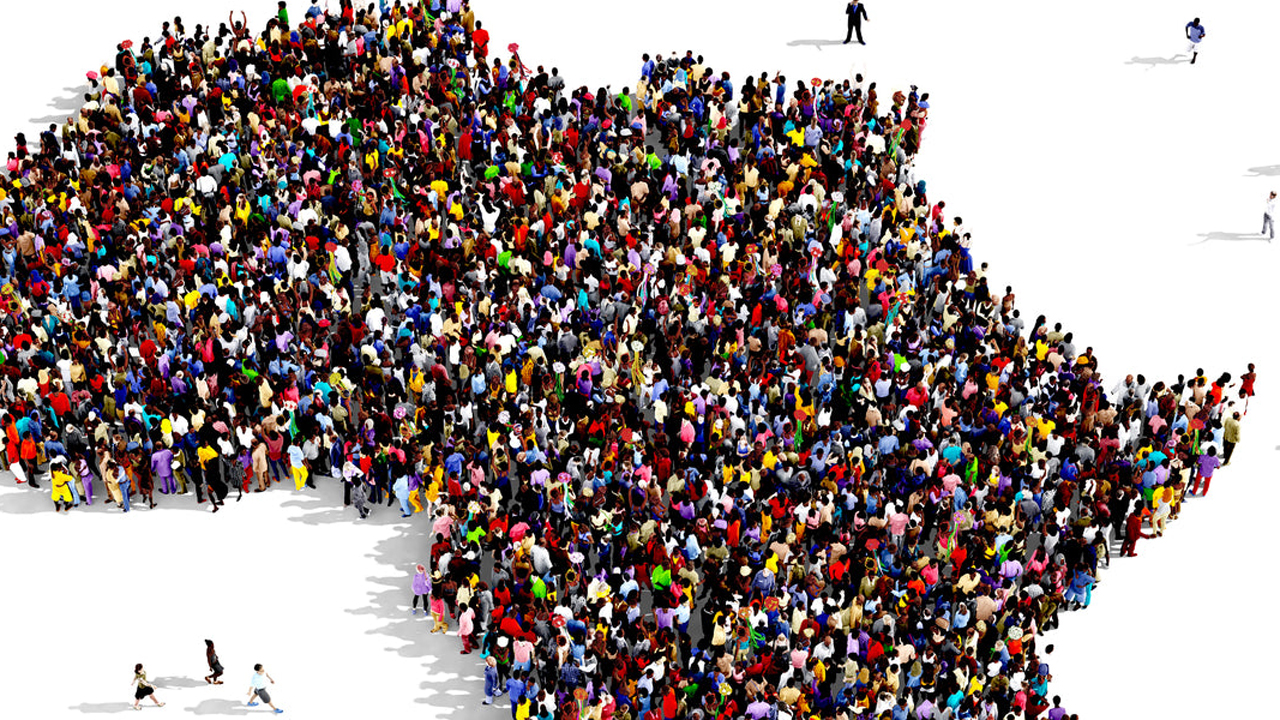 Founded in 2010, ADN is a Silicon Valley-based nonprofit that promotes entrepreneurship and economic development on the continent, with the aim of bringing together Africans on the continent, in the diaspora and friends of Africa to actualize their full potential, activate their entrepreneurial spirit and strategically mobilise financial and intellectual resources to ensure a brighter future for the African continent.
Founded in 2010, ADN is a Silicon Valley-based nonprofit that promotes entrepreneurship and economic development on the continent, with the aim of bringing together Africans on the continent, in the diaspora and friends of Africa to actualize their full potential, activate their entrepreneurial spirit and strategically mobilise financial and intellectual resources to ensure a brighter future for the African continent.
In November last year, to celebrate the Global Entrepreneurship Week, ADN announced 11 entrepreneurs named Builders of Africa’s Future (BAF) who received $25,000 grants from the U.S. African Development Foundation (USADF).
The funding will be used to support African organisations honoured in the BAF 2022 cohort.
Each of the 11 organisations is impact-oriented, African-led and represents the healthcare, education, agriculture, renewable energy and menstrual health sectors.
Since 2018, ADN has recognised and catalysed 53 African startups in five cohorts, recognizing the rising stars of African entrepreneurship as they build the continent’s future through nonprofit and for-profit businesses addressing the needs of their communities.
According to the Founder and Executive Director of ADN, Almaz Negash, “ADIS23 offered a platform to bring this critical dialogue on beyond remittances back to Silicon Valley, the center of world’s innovation and enterprise.
“With a median age of 20 years and 60 per cent of the population under 25, Africa is the youngest continent in the world and holds the future. Projections show that a quarter of the world’s people will be African by 2050. Africa has an opportunity to drive major transformations that adapt to this drastic demographic shift and build resilience in an era of disruption.
“The unforeseeable economic shocks created by the pandemic, international conflicts such as the war in Ukraine, and challenges in the global economy have sparked innovations in industry, investment, and entrepreneurship across the continent. Now, 10 years into Agenda 2063, Africa must plan for a sustainable recovery and reimagine its path forward. What does a future-ready Africa look like?
“This year, the 8th ADIS sought to explore trending innovations, blueprints for the future, and the interconnectedness of sectors including climate change, healthcare, finance, education, and agriculture. How do we strengthen infrastructure, reinvigorate markets, and create a healthy atmosphere for communities? What seeds must be planted to enable a thriving future for the continent?
“I believe that the prosperity and success of Africa can be measured by our move away from reliance on remittances. There are new approaches and investment opportunities trending across the continent, including the African Diaspora Finance Corporation (ADFC).
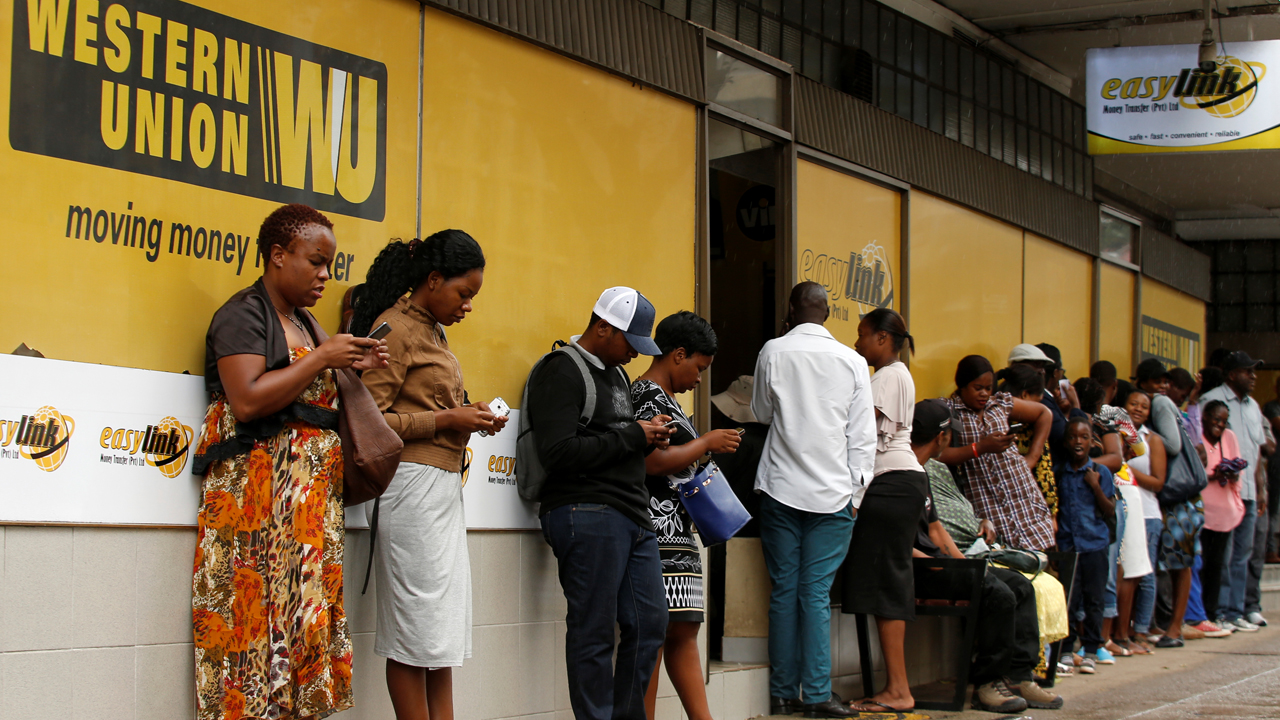
“Africans in the diaspora are truly a force for good, giving abundantly to the communities they live in and back home to friends and family. They are the largest direct investors in Africa, not just from abroad, but within the continent, with 70 per cent of migration occurring within Africa.
“These payments provide a financial crutch to millions of households. This is why smaller, poorer and more fragile economies are so dependent on them,” she said.
With the rise of many startups in the technology and creative industries in Nigeria and the continent, Africans have been urged to work more on providing solutions to problems, rather than rely solely on remittances and grants from the diaspora.
The U.S. President Joe Biden-administration has, on several occasions, reiterated that its engagement with Africa is a priority. For Negash, “it’s a good thing, though there is a lot of talk but I think there is a process and that is the point we are. I do know the Biden administration is very committed from the actions that we see, not only because of us the diasporans, but because Africa is important to the United States.
“After the U.S. Africa Leaders Summit (USALS), we have been engaging with the State Department, USAID and others that are working on this issue. We are also not waiting for them to do the action; we are taking the proactive action of taking Beyond Remittances everywhere.
“As diasporans, waiting for the government to make this work is not going to happen, we need to own it. The diaspora is in a space of innovation, investment and capital development and we need to engage these resources for the maximum benefit of Africans.
“Going through the EY Africa Attractiveness Report shared at the symposium, FDI to Africa plus any aid that comes to Africa is way less than the $90 billion plus remittances that goes to the continent. Think about it, it is huge. And it’s not going to stop, because if my relatives ask me for money, I will do everything I can to give it to them, but it is not enough, it is not scalable, because this is going from one family to the other.
“What we are asking is can we tap into the savings that we have and start to think and imagine other ways we can invest in the continent and this is a huge opportunity for the diaspora to make a difference in the continent.
“However, the governments of Africa, the 54 governments, need to create a conducive ecosystem for the diasporans to come in, from the tech investor diasporans in Silicon Valley, California to the big financiers in New York, connected big diasporans in Washington DC and some energy folks in Houston, all of these groups are important to the future of Africa.”
In his remarks at ADIS, CEO and General Partner of Fund for Africa’s Future (Future Africa), Iyinoluwa Aboyeji, said over-reliance on remittances from diaspora without adequate scale-up in human capital would limit Africa’s progress into development.
According to him, diasporans have three Ts – Time, Talent and Treasure, but there is too much attention on the treasure.
Making reference to the logistics challenges that have characterised the demonetisation policy of the Central Bank of Nigeria (CBN) for weeks, he said: “I recall when India set up its demonitisation policy some years back, it engaged the talents of its diaspora community. Nigeria is a much smaller country than India.
“As giant of Africa, we shouldn’t be going through the hassles the CBN policy has caused in weeks now if the infrastructure end of the cash policy had been sorted before implementation and roll out.”
As head of Future Africa, which is Africa’s largest seed stage investor, Aboyeji has invested millions of dollars into over 100 startups across Africa. This was after co-founding Flutterwave, a billion-dollar global payments platform connecting African businesses and individuals to the global economy.
Speaking to The Guardian, he said: “Africa is on a journey, but we are not going to get there by copying models from other places or throwing money at the problem. It is going to require intellectual investment. There should be a mindset shift that you don’t need diaspora money as much as you need the knowledge transfer.
“There is a lot of money in Africa, we raised $10 million fund at the wake of COVID-19 in the last two years and 60 per cent of the capital came from Africa. What it tells us is that a lot of resources and opportunities are in Africa but unfortunately a lot of government’s borrowing or policies tend to crowd out these investments and startups.
“Despite the odds, you still have a lot of Africans investing their personal savings in innovative solutions to help Africans while a lot of pension funds, money sitting in the banks and public funding are crowded out by government bonds and borrowings.”
Board Chairman of ADN and Founder/Managing Partner, Ignite Venture Studio, Josh Ghaim, said the ADN through its yearly symposium, ADIS and other programmes, is seeking to connect the bridge between diaspora funding and investment to startups in Africa seeking to develop the continent with their innovative solutions to problems.
“I don’t want to simplify it and say money is easy to find but the most important criteria is the human capital. We have a large community of diasporans in America and the West who are high up in corporations, government and the academia and understand the business and what it takes to thrive. How do we harness these resources and make these people available to help entrepreneurs in Africa.
“Entrepreneurs don’t have to repeat all mistakes or go through the hassles that could be avoided. The number one priority of ADN is to deploy and engage these resources available to everyone through mentorships. And, its not just Africans, but African Americans and friends of Africa. We want to help their businesses scale to the next level with investible funds. Through Builder of Africa project, we are giving them $25,000 and the technical skills to scale up their businesses.
“This is why beyond remittances is important. Unless we create awareness, we are not going to engage fully into the resources of the diaspora community.
“Also, Africa countries should securitise remittances to promote investments, especially for infrastructure on the continent. The diaspora can offer a lot more than remittances and investments. They have skills, knowledge, know-how, exposure to the world of business and investments, science, arts and technologies, that can help boost the human capital for Africa’s development. They can help build world-class universities, and they can be mentors for the new generation of Africans.
“That is why all governments in Africa should prioritise affairs of the diasporans. African countries should establish Ministries of Diaspora to give policy priority to the specific needs of the diasporans, as well as expand the investment opportunities for them through special incentives.
“The diasporans should also be allowed to vote. If they can send money that powers their home economies, they should also help decide the future of the economies of Africa,” he said.
AN interesting feature of this year’s ADIS23 was the celebration of ingenuity and innovation of African entrepreneurs with the conferment of the prestigious Barka Award on Dr. Amadou Alpha Sall, CEO, Institut Pasteur de Dakar in Senegal and Director, WHO Collaborating Center for Arboviruses and Viral Hemorrhagic Fever.
Also honoured were 10 Diaspora deserving leaders who received the Luminaire Awards.
The Barka Award honours a notable individual for their distinguished contributions to Africa and the African diaspora community. ‘Barka’ is an expression of gratitude used in multiple languages and cultures in Africa, including Nigeria, Ghana, Burkina Faso, Kenya, Zambia and the Democratic Republic of Congo.
ADN presented the sixth Barka Award to Sall for playing a vital role in the largest Ebola epidemic in history in 2014-2015 in West Africa and for being the first African Director of Institut Pasteur in Dakar, one of the world’s top scientific and public health leaders on emerging diseases and epidemics. The Institut co-manufactured a $1-handheld COVID-19 diagnostic test kit that can give results in a matter of minutes with the leadership and guidance of Sall.
Fortune Magazine listed him among the world’s 25 greatest leaders for 2020 for his role in the response to COVID-19 in Africa.
“I can’t think of a more deserving recipient of the Barka Award than my dear colleague and friend, Amadou Sall. As one of the world’s top scientific and public health leaders on emerging diseases and epidemics, Amadou has made cutting-edge contributions in developing and disseminating diagnostic and control tools for viral diseases like Ebola, Chikungunya, Dengue and COVID-19. ADN thanks Amadou for all he has done and continues to do to build the Africa we want,” Deputy Director of Global Partnerships and Grand Challenges, Bill and Melinda Gates Foundation, Kedest Tesfagiorgis, said.
Senior Director – Product Strategy Leader, Global Supply Chain, Roche-Genentech and Board Member, African Diaspora Network, Ndeye Makalou, said: “Dr Amadou Sall has a deep and abiding love for our continent and its people, and a singular determination to secure our health. In the face of adversity and skepticism, he confidently corralled African excellence and energy to tackle the most difficult infectious diseases challenges with which we are faced, adopting a holistic approach that encompasses everything from education to product innovation and everyone from administrative to scientific staff.”
During his keynote address at #ADIS23, Sall encouraged diasporans to invest in healthcare innovations in Africa, stressing that Africa, “in terms of healthcare, is full of opportunities if you want to solve a healthcare access-related problem.”
Speaking on the significance of the award, Sall said: “It is exciting to me receiving this award because Silicon Valley in the world is the centre of innovation. Despite the challenges many African startups face, celebrating our success stories is a huge development.”
Acknowledging that the award will spur him to do more, he added: “Clearly, one of the greatest opportunities we have in young people is their creativity. That is why we give seed money to help them carry out visibility studies and prototyping.”
In addition, 10 distinguished Africans and Diasporans, who continue to make high-level impacts on a global scale and demonstrate their commitment to advancing the African continent received the coveted Luminaire Awards.
The Luminaire Awards were presented to Yohannes Assefa, Board of Directors, Ethiopia Diaspora Trust Fund; Twum Djin, Head of Engineering, Payments Conversion at Stripe; Dr. Josephine Fubara, Chief Science Officer, Sanofi Consumer Healthcare; Dr Josh Ghaim, Founder/Managing Partner, Ignite Venture Studio and Board Chairman, African Diaspora Network; and Dr. Ndeye Makalou, Head of Health Equity- Genentech Commercial, Medical and Government Affairs at Roche Genentech.
Others are Investor, Founder and CEO, Ujama, Hugh Molotsi; Creative Ambassador, City of San José & Founding Director, Silicon Valley African Film Festival (SVAFF), Chike Nwoffiah; CFO; Innocent Shumba, US-West EY Private Leader and Assurance Partner, Ernst & Young Abbey Omokhodion and Deputy Director of Global Partnerships & Grand Challenges, Bill & Melinda Gates Foundation, Tesfagiorgis.
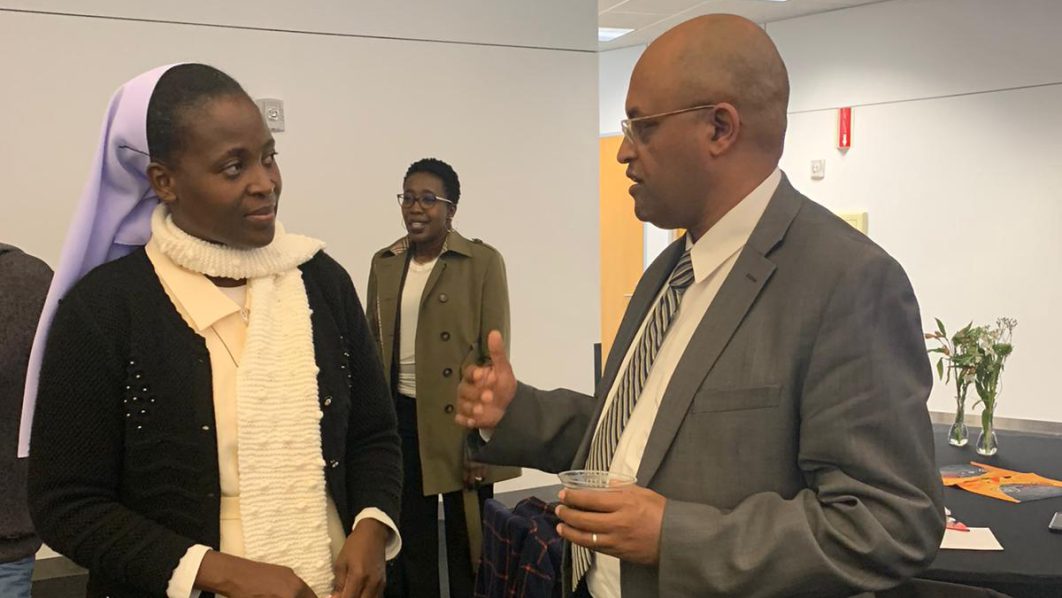
Recipient of the Builders of Africa’s Future (BAF) award, Sister Juunza Mwangani of Emerging Farmers Initiative (left) and recipient of the Luminaire Awards, Yohannes Assefa, Board of Directors, Ethiopia Diaspora Trust Fund
Sister Juunza Christabel Mwangani of Emerging Farmers Initiative is one of the Religious Sisters of the Holy Spirit, a congregation of women based in Zambia and one of three Catholic sisters among 11 entrepreneurs recognised with a Builders of Africa’s Future (BAF) award in 2022 by ADN.
Each 2022 awardee presented their programs and received a $25,000 grant from the U.S. African Development Foundation (USADF) after completing the Start Your Social Enterprise training. This came after she participated in a Silicon Valley social enterprise ‘accelerator’ which in 2019 linked with a network of African nuns to help low-income families help themselves.
Armed with previous experience in business as well as a business degree, Mwangani is today blending her charity work with business.
Based in the southern province of Zambia, Mwangani has being a sister for the past 20 years, working as a hospital administrator and on the social enterprise sector in the country.
At ADIS23, Mwangani set the ball rolling on the opening day of ADIS23 with a fireside chat on Changemakers: Catholic Sisters on the continent.
Speaking on the significance of ADIS23, Mwangani said it was an essential follow-up to the selected entrepreneurs on the Builders of Africa’s Future project, an elite list of entrepreneurs within Africa that have shown concepts and solutions that can build the future of Africa in the sense that they have come up with innovations that are likely to change the narrative and bring out what Africa needs to grow to its potential.
She said: “We are into education for eco-friendly agriculture and entrepreneurship skills. What we are really doing is to combine agriculture skills and entrepreneurship into education because we know that when education is solely on academics only, we are likely to have more people who are looking for white-collar jobs after finishing school. We are equipping them with skills so that when they walk out of class, they are not waiting for somebody to create wealth and employment for them.”
On her takeaway from ADIS23, she said: “What I take away from the conference is that the future of Africa is in the hands of Africans. It is for us to devise our own future and I am going back home as an African to chart African solutions for Africa.”





